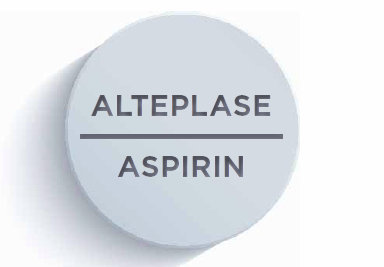Aspirin was safer in mild stroke, and worked just as well.
Despite the limited evidence for its benefit, and ample evidence of harm, alteplase is still guideline-recommended care for patients with acute ischemic stroke with disabling neurological deficits.
Most of the prior major stroke trials (i.e. NINDS, ECASS, Atlantis, etc.) explicitly excluded patients with mild neurological deficits. This limits the evidence for or against the use of alteplase in this cohort of patients. The Potential of rtPA for Ischemic Stroke with Mild Symptoms (PRISMS) trial sought to test the efficacy and safety of alteplase administered within three hours of onset of ischemic stroke symptoms in patients presenting with minor neurologic deficits. Minor strokes were defined as NIHSS scores of 0–5 with non-disabling deficits.
The PRISMS trial was a double-blind, double-placebo, multicenter and randomized clinical trial performed at 75 stroke hospital networks in the United States. Patients were randomized to intravenous alteplase 0.9mg/kg with oral placebo vs. oral aspirin 325mg with intravenous placebo. The trial was originally designed for 950 patients, but due to early termination, only enrolled 313 patients. The primary outcome was the difference in favorable functional outcome at 90 days, which the authors defined as a modified Rankin score of 0–1. The primary safety outcome was symptomatic intracranial hemorrhage within 36 hours of intravenous treatment.
In the 313 recruited patients, the median NIHSS score was 2 (Range 1–3), median time to treatment was 2.7 hours (Range 2.1–2.9) and 90% (281 patients) completed the trial. The headline results were no difference at 90 days in achieving a favorable neurological outcome with alteplase compared to aspirin, but also importantly, an increase in symptomatic intracranial hemorrhage (3.2% with alteplase vs. 0% with aspirin).
PRISMS asked a clinically important question with patient-centered outcomes. It is the only randomized controlled trial to date comparing alteplase to another medication as opposed to placebo. However, the authors of the paper state that despite the researchers’ wishes, the study was terminated early by the sponsor, who happens to be the pharmaceutical manufacturer of alteplase, due to patient recruitment being below target. The authors also state the data results were not unlocked prior to termination. Still, one wonders if whether the sponsor inferred no benefit and therefore terminated the study early.
It is important to note that not all low severity strokes (NIHSS < 5) are non-disabling. A patient with isolated leg weakness or isolated aphasia may have a low NIHSS but, clearly, these deficits would be disabling. The definition of “not clearly disabling” is subjective and requires individual clinician interpretation.
Finally, in this study, 13% of patients were found to have stroke mimics. That is one in eight patients enrolled were exposed to a harmful medication (with significant costs) with no hope for any neurological benefit.
Unfortunately, the early termination of the study precludes definitive conclusions and therefore limits application of its findings in practice. In the absence of any benefit (this includes not only the primary outcome, but also any of the secondary or exploratory outcomes) with clear potential for harm (symptomatic intracranial hemorrhage), equipoise is lost in our opinion. Clinicians should strongly consider aspirin instead of alteplase in patients with acute ischemic stroke with non-disabling neurological deficits, until better evidence is available.



